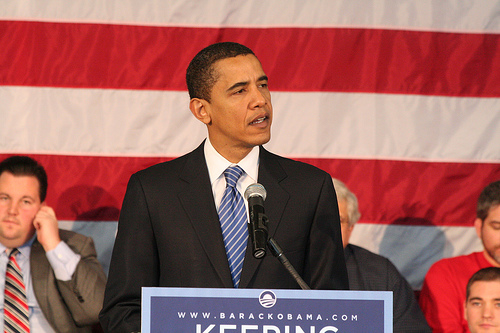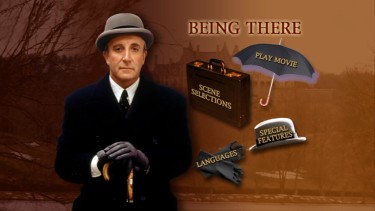Chauncey Gardiner and the Audacity of Hope
(A tale of two political figures – one fictional as well as accidental, one real and very intentional.)
As long as the roots are not severed, all is well.
This week I re-watched the brilliantly constructed satire, “Being There.” (A 1979 film directed by Hal Ashby, adapted from the 1971 novel written by Jerzy Kosiński.) Peter Sellers plays a simple-minded gardner with no social or intellectual skills, being essentially raised by television sets and the plants he tended. When forced into new situations such as befriending a billionaire and meeting the president, he is mistaken for a genius of sorts. “Chance the Gardner” becomes “Chauncey Gardiner,” his simple sentences interpreted as deep metaphors about the state of the nation.
Here are some lines from the “meeting the president” scene:
President “Bobby”: Mr. Gardner, do you agree with Ben, or do you think that we can stimulate growth through temporary incentives?
[Long pause]
Chance the Gardner: As long as the roots are not severed, all is well. And all will be well in the garden.
President “Bobby”: In the garden.
Chance the Gardner: Yes. In the garden, growth has it seasons. First comes spring and summer, but then we have fall and winter. And then we get spring and summer again.
President “Bobby”: Spring, and summer.
Chance the Gardener: Yes.
President “Bobby”: Then fall and… winter.
Chance the Gardener: Yes.
Benjamin Rand: I think what our insightful young friend is saying is that we welcome the inevitable seasons of nature, but we’re upset by the seasons of our economy.
Chance the Gardener: Yes! There will be growth in the spring!
Benjamin Rand: Hmm!
Chance the Gardener: Hmm!
President “Bobby” Hmm. Well, Mr. Gardner, I must admit that is one of the most refreshing and optimistic statements I’ve heard in a very, very long time.
[Benjamin Rand applauds]
The metaphors remind of my own “Autumn Contemplations” post (maybe I’m a simpleton, too!) And today I found myself contemplating not just the Autumn leaves, but the scriptwriter’s phrase about the roots.
As long as the roots are not severed, all is well.
I started thinking what “severed roots” might represent if, indeed, the metaphor did apply to a nation under stress. And what “severed roots” might we have in our lives, as individuals, in this time of pruning?
Some of the roots being severed are our dependency on cheap, easy credit. No more stated income loans in which a buyer can claim his income and finance the entire appraised value of a home. No more borrowing against equity in an inflated market.
Roots have also been severed in the de-regulated financial markets. No more taking bad loans and selling them off for someone else to service. No more misleading ratings on worthless re-packaged investments.
Even some of the “good roots” seem to have been severed. No more stability in stock markets and job markets. And trust between Main Street and Wall Street suffers a huge blow.
Some trees are falling, all is not well in the garden.
But as Chauncey seemed to be saying (if only he knew what he was saying), what roots remain that might carry us through this winter?
Perhaps the loss of jobs will take us back to some older, earlier roots. Long before the dot.coms, before the technological revolution, before the industrial revolution, there were cottage businesses. Remember the butcher, the baker, and the candlestick maker? They didn’t need unemployment benefits. There were no corporate lay-offs. Family businesses, farms, and small businesses consisting of master craftsmen and apprentices were the norm.
The roots of many things as we know them have been severed. Traditional jobs are going away, shipped overseas or replaced by contract workers who are paid for results and not hours. Benefits continue to be slashed. Pensions shrink and disappear. Social security vacillates between a joke and a fantasy for those not yet of age. The government cannot compensate for the failures of business and continued economic crises. But those who dare to take matters into their own hands through self-employment will ultimately be the winners in a brave new world that might look, surprisingly, like the branches of an older, wiser tree.
Against all reasonable odds, not unlike the rallying of New Yorkers after 9/11, I feel that HOPE has somehow taken root. (Or perhaps been discovered buried beneath the surface.) And it is not a fictional gardner-turned political guru that brings this hope, but a very real political figure. As McCain’s gracious concession speech on November 4th affirmed, “America offers opportunities to all who have the industry and will to seize it. Senator Obama believes that, too.”

Four years ago, when Democrats watched the agonizing loss of Kerry to Bush, who could have guessed that it would take a young black man with a foreign-sounding name (that rhymed with “Osama”) to unseat the party in power? But Obama personified the “Audacity of Hope.” In winning the election, Barack Obama has given us all a roadmap. It’s a roadmap for Americans, a roadmap for entrepreneurs, and a roadmap for anyone, anywhere with a dream.
1. Articulate a vision. Declare the change you intend to make in the world. Declare it every chance you get, whether on a stage, in a book, on a tv or radio show.
2. Don’t look back. Keep your eye on the prize, always. Focus on what you want, not what you don’t want. Focus on where you’re going, not where you’ve been. Don’t be daunted by the odds or naysayers. Instead, set a precedence.
3. Surround yourself with good people. Barack gave much credit to his campaign managers, many volunteers and staff, and his running mate Joe Biden. Few can argue that McCain’s choice of Palin drew questions about his judgment and haunted his campaign.
4. Prepare for challenges. In the first debate of 2008 presidential candidates, political analysts wondered if McCain’s experience in foreign policy would discredit Obama. Instead, Obama came well-studied, with strategies, convictions, and good points, and held his own in the debate.
5. Embrace hope and change, not fear. The McCain campaign did much to rally the fears of many Americans, fears that Obama might be pals with terrorists, and many other misleading scare tactics. In the end, it was the McCain of the gracious concession speech that resonated with most Americans, not the angry, accusatory McCain of the campaign trail.
6. Be an inspiration. Obama’s “Yes We Can!” acceptance speech may mark the first time in many, many years that a crowd of onlookers has been moved to tears by a political speech by a president or a president elect. And the crowd of inpired onlookers was not limited to our borders. Tales of tears and celebration came from all corners of the globe!
My intention here is not to “get political,” but to see what might be learned from a man who has defied all odds to obtain an unprecedented victory. And to mine the “wisdom” of an imaginary old gardner who might have known only a thing or two, but known them well.
Obama: “Yes we can!”
Chauncey Gardiner: “I understand.”

Interesting piece. I read a similar piece using the Gardiner analogy only this one asserts Bush is like Chauncey Gardiner.
Thanks for reading, Jack, and for sharing the link. I remember “Chauncey” being compared with Reagan, although the novel and the movie both preceded his election.
I think one reason that movie remains such a classic and rings so true is not only because it skewers politicians and mocks the media (which it does mercilessly), but because it shows that even the simplest among us actually do possess great wisdom. (“Out of the mouths of babes….”) In my mind, Chauncey is more like Forrest Gump than Bush.
Barack Obama’s book, “The Audacity of Hope,” shows a appealing title. It has an idea of bravery mixed with confidence. You’ll find nothing Pollyanna concerning this. I won’t support everything he says, but he’s our president, as well as for me, he creates trust. Which will do more for just a nation than any volume of backroom deals. Hope gives us energy, and energy sustains us through trying times. Boy, we’ve had them. I’m from West Texas, and I did not vote for Bush. When McCain ran against Obama, I used to be a citizen of Arizona, but I gave audacious hope a chance. The fight for progress and laying the foundations of prosperity isn’t over. I have seen the quips of those that don’t think Obama is capable of it. But step back a moment. Would anyone have all of us fail only to tarnish the star of an incumbent for whom they didn’t vote? Attempting to keep our priorities straight, let’s work together with our president and build our future.